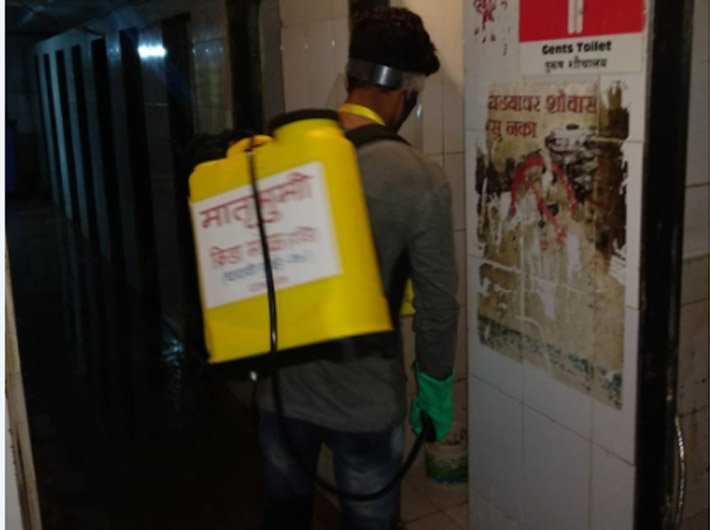A novel project aims at cleaning up community toilets to prevent Covid-19 spread
Even as humanitarian support is pouring in to help distressed migrants amid Covid-19 pandemic and the lockdown, civil society organizations and NGOs are working for sanitation of community toilets which have become breeding source of virus infection.
Every community toilet has 20 seats. Each seat is a 2x2 or 4x4 block with an attached door and used by at least 50 users in community. Water in community toilets is available through tankers, BMC water connections and bore wells, yet not everyone has water availability.
“Despite migrant exodus in Mumbai we are working in some very densely populated communities with very few community toilets while some others may have lesser no of people. One COVID-19 infected user can spread the disease to a large no of people in community through the toilet. Even before the MCGM came out with its circular waiving off user fee for every toilet user most community toilets had already stopped charging after corona cases started getting detected. The civic body has so far not said anything on expenses towards running and maintenance of these community toilets for WASH (water and sanitation hygiene) by the caretaker who is managed by the CBO (community based organization)’ says Aniket Jadhav, programme head, Triratna Prerna Mandal, which along with CACR and UNICEF is implementing a sanitation project called 'Flush the Virus: Mumbai Diary'.
As an example, he says, suppose a CBO earns Rs 200 per month, he has to spend for Rs 60 on electricity, Rs 60 on water bill, Rs 50 on disinfectants and keeps Rs 20 for himself. Lack of funds is compelling caretakers to leave.
The project will be implemented at 150 community toilets and 50 BMC schools which are being used as quarantine centres in G North ward at Dharavi, M East ward at Mankhud,Govandi, Chembur, Vikhroli, Maharashtra Nagar, Cheetah Camp and H East ward at Vakola, Santacruz East.
Paddle-operated non-touch hand washing stations will be provided at these 150 community toilets and 50 BMC schools used as quarantine centres for males and females. So far donations have come from Tech Mahindra for disinfectants, brooms, wipers, bleaching powder etc for 20 community toilets and the implementers are now expecting donors for another 130 toilets.With more and more field workers getting infected, volunteers are reluctant to go to Dharavi. To avoid movement in and out of Dharavi, the NGOs are now identifying volunteers from within Dharavi through their online meetings with community based organizations (CBO) and also finalizing insurance of volunteers who will do field work with wearing PPE kits.
“In G North ward specifically Dharavi we have identified 32 MCGM community toilets and bifurcated these in 2 clusters of 16 each with two mascots (volunteer) in each cluster. M East ward with 96 community toilets is a huge ward where we have 4 clusters of 24 toilets and the intervention is going to be in risk communication activities (RCA) and infection prevention control activity (IPC). Our mascots will create awareness through audio messaging on mega phone for taking basic precautions for avoiding exposure to COVID-19.Posters and banners will be put up at MCGM community toilets. We are in the process of creating SOP’s and checklists and conducting online training for CBOs and their care takers as well as BMC officials which we will be disseminating to them. Besides we are continuously coordinating with MCGM officials for proper use and spray of disinfectants at touch points like latches on toilet tank, door, taps and door lock,” says Jadhav, making an interesting observation that awareness generation is reducing the frequency of toilet use in community.
The CBOs are formed by and for the communities under the supervision of MCGM through their Slum Sanitation Programme since1995 which is now discontinued. The responsibility of community toilet formation has been given to 24 respective wards and put under solid waste management department. The MCGM remains a supervisory body and the CBOs are registered under the Charity Commissioner and Bombay Port Trust Act.
Calling for strengthening of CBO, he says that the these organisations have the record of every single user and have the reach to last mile and it is only best if MCGM works in close coordination with CBOs for grassroot penetration as they understand the communities well. “The issues of toilets both at community level and of MHADA must be addressed quickly. Specifically MHADA toilets are generally unmanned and breeding spot for disease. With the situation worsening by the day, 'Flush the Virus: Mumbai Diary' is seeking help from donors for sanitation of community toilets,” he says.

